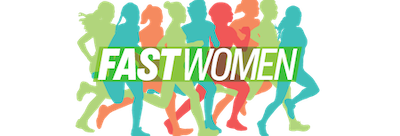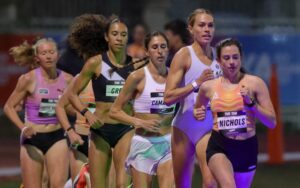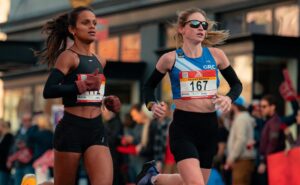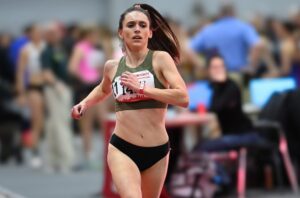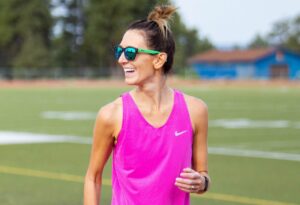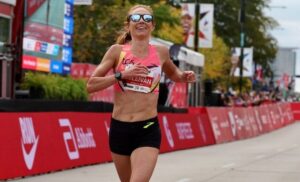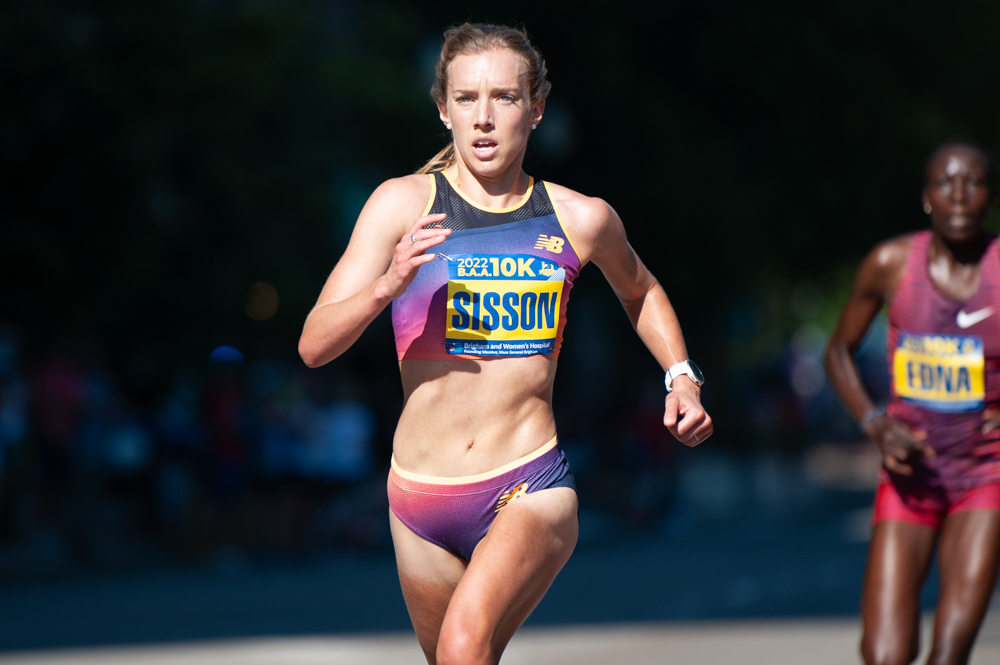
Emily Sisson, 31, set an American record in the marathon at last year’s Chicago Marathon, running 2:18:29. She had planned to run the London Marathon in April, but a poorly-timed injury forced her to withdraw. Sisson pivoted and focused on some shorter races instead, and she finished fourth at both the New York Mini 10K (31:16) and the B.A.A. 10K (31:35) in June. Sisson is now gearing up to return to Chicago in October, and she’ll also run next weekend’s Falmouth Road Race and the New Haven 20K, which serves as the USATF 20K Championships, in September.
Sisson spoke to Fast Women last week. This interview has been edited and condensed.
When you’re marathon training, are you mostly just training and recovering?Pretty much. I feel like marathon training is everything I normally do, but just a lot more of it. A lot more sleeping, a lot more eating, a lot more recovering between running, and a lot more running itself.
And you’re back in Rhode Island—is there something you like about Rhode Island for a marathon build, or is it more the time of year that has brought you there?
A bit of both. We came out last year when we decided I wanted to do my marathon build at sea level. It’s too hot in Phoenix, which is close to where we live in Flagstaff, so we came back to Rhode Island, where my coach (Ray Treacy) is. It worked really well. I really like Ray’s training at sea level for marathons. I think altitude works really well for me for like 4–6 weeks at a time, but after that, I get a little too tired.
Given that, looking ahead to the Olympic Marathon Trials buildup, does that mean you’ll be splitting your time between Phoenix and Flagstaff?
We haven’t actually planned that far ahead, but with the Trials being in Orlando, we’re also tossing around the idea of going to Florida or somewhere more humid to prepare. We’ll see after Chicago.
Do you enjoy the grind of marathon training?
I like the challenge of it, because it’s so different from anything I’ve done before, and I like the challenge of doing long runs harder. But after the marathon’s over, I definitely enjoy my down time. I like when my energy comes back, and I have energy to do things outside of training.
Do you ever find yourself not wanting to go out for a run?
It’s funny because I feel like I am pretty intrinsically motivated, but I was talking to my husband (Shane Quinn) the other day. I feel like when I am marathon training there definitely are some days when we get to wherever we’re working out and I’m just like, “I kind of would rather not push my body so hard right now.” But I use the phrase “motivation follows action” a lot. So often once I start a workout, start warming up, or start a run, I feel better. I never regret going for a run, but sometimes just getting started is the hardest part. It helps having friends or teammates, and so I do try to sync up with Molly (Huddle) and Shane quite a bit.
Has running an American record in the marathon changed your life in any way? Do you get more attention? Do people recognize you more?
Maybe at races, I do notice a few more cheers, so that’s always nice. I feel like it was a good learning experience, though, because I felt like, going into Chicago, I really didn’t have a lot of experience in the marathon. I had only completed one before, so it was good to kind of get some feedback from another marathon and another marathon build. That build was a little different from the two we’d previously done, and I think it worked out better. So it changed my training a little bit, but not my life too much.
Based on what you’ve learned, will your buildup for Chicago look pretty similar this time, or are you trying anything new?
We’re kind of sticking with what we learned from the last one, since it is Chicago again. But one of the things that we did change was my build last year was accidentally shorter, because I was struggling coming back from Covid and training up at altitude. So we started the buildup later than we meant to. But I kind of had a feeling, based on my previous two marathon builds, that I kind of needed shorter buildups anyway, and I thought that we timed it perfectly. We also cut out some of the speedwork we did in the first two, and I felt like that helped prevent me from getting too sharp and maybe peaking too soon.
We’ll probably stick with that for Chicago and the Trials, and then maybe we’ll play around with changing some things after. I tried adding in altitude for the London Marathon, and I think I realized I probably need to be down at sea level doing the training that we do. It also didn’t help that it was a really bad winter. We got a lot of snow in Flagstaff.
How far did you get into your London Marathon build before you had to abandon it?
I want to say it was the end of March. It’s the only hip injury I’ve ever had. It actually healed really quickly, I just needed to do a bit of strengthening, but it took a month, and missing a month six weeks out from London wasn’t good. I didn’t want to rush back and cause any other problems, so we decided to do some shorter races instead.
Have you thought about how fast you can go in the marathon on a perfect day? Do you have times in mind when you’re training?
I feel like after Chicago, it was immediately one of the first things I got asked, even by some friends and people I work with. They were like, “How much faster do you think you can go?” I’m like, “Just give me a minute.” I do think, given that I went into the Chicago build not feeling great, I feel like I turned it around pretty fast and was able to have a good day. But I feel like if I maybe start the build not so fatigued, and kind of stack more marathon builds, I do think I could run a bit faster. Whether that’s what the focus is in Chicago or not, we’re still going to decide on that.
When do you make that decision? And what do you base it on?
It’s something I’ll probably just decide with Ray. And probably the weather will make a big difference, whatever we decide to do. But I think the goal going into Chicago will be to try to compete well against the other American women, as a good tuneup for the Trials in February, and come out of that feeling as good as I can so I can start the marathon build in a good place. Luckily I did come out of Chicago feeling really good last year.
What are your current thoughts on the noon start time for the Trials?
I’m all for promoting the sport and trying to get the marathon trials on primetime would be amazing. I don’t know enough about broadcasting to know what’s the difference between having it live and having it tape-delayed, if necessary, and if it’s even possible to move a race like that last minute, or do you have to decide that farther in advance.
I think it is kind of rolling the dice a bit with whether you’re going to get a hot day, and Orlando’s probably just more likely than somewhere else. I don’t think we should be expecting or wanting perfect conditions for our Trials, but at the same time, [not] something absurdly hot. Big picture, that time of year, it is kind of hard to prepare for a race that’s in the high 70s at the start or 80 when it’s winter in the U.S. Most places that we train in January won’t be that warm consistently, so we’ll have to be a bit creative.
It would be nice knowing more and what the contingency plan is if we do get a hot day. Hopefully the weather won’t be anything crazy warm or extreme in any way. With any marathon, you never really know what the weather’s going to be like, but with it being at noon, running in 80 degrees at noon is different than 80 degrees at 6 a.m. or 8 a.m. just because the sun is so strong.
It seems like there’s some good research on how to prepare for hot races, and I hope all of the qualifiers will have access to that kind of information so that we don’t see a bunch of people collapsing during the race.
I think that is the main thing. I was asking my husband, “Why am I getting so into this?” Because I do feel like when I’m fit, I handle the heat well. But I don’t want to see what we saw (at the 2016 Olympic Marathon Trials) in LA where like [a significant percentage of] the field drops out, or you don’t want to see people collapse or run themselves to heat exhaustion.
Can you tell me about the various shoes you use in training? I’m always curious about which ones people choose.
The 880 is my daily trainer and I do most of my runs in it, apart from workouts, even my long runs. A lot of people do long runs in the shoes they race in, but I just like doing mine in my trainers. I’ve been using those since my sophomore or junior year of college. They’re just a really good, consistent neutral trainer that I love running in. For workouts now, I pretty much do everything in the Pacer. I really like it. I think because of how I run, it’s just a shoe that really suits me. I do pretty much everything in them. I think a lot of people would like the Pacer especially for shorter workouts or faster stuff, because they’re lighter and they feel snappy.
The Pacer has a low stack height compared to many of the super shoes on the market. Are you ever tempted to go with an even more substantial shoe?
I did just do some testing in a new shoe they have coming out, so it will be interesting to get those results back. But I really get a benefit from racing in the Pacer. I felt like after Chicago, it was the first time I walked away from a marathon and that week, I could have worked out if I wanted to. I didn’t even feel like my legs necessarily broke down at the end of the race. I more just felt like I was getting tired, like I would at the end of any race.
The reel you posted with Shane being over marathon training was great. Is he pretty much running to run with you, or would he be training either way?
We used to joke that he kept trying to retire, and I just wouldn’t let him. He was a good collegiate runner and he ran on a lot of Ireland’s junior teams growing up. After college, he was pretty content moving on. He got a job as a psychologist, working with a lot of kids. It was tough work but he really enjoyed it and felt like he helped a lot of people. But I think back in 2018, I was going through a rough patch with my training and I was gone all of the time and he was like, “What if we went all in together on your career and tried it for a year and see what happens?” He took a step back from his career and we moved out to Arizona so we could get good altitude training, good sea-level training, good treatment, and be together and be in one state most of the time. And it worked really well.
It surprised me how much of a difference it made having him doing all of my workouts. At first it was nice having someone who could pace all of my workouts perfectly. But then I realized how much of a difference it made having him there to make it fun. Especially the more years I do it, it’s just really nice having someone like him there because he just keeps things so light. It makes the workout days fun and manageable.
This feature is sponsored by New Balance.

